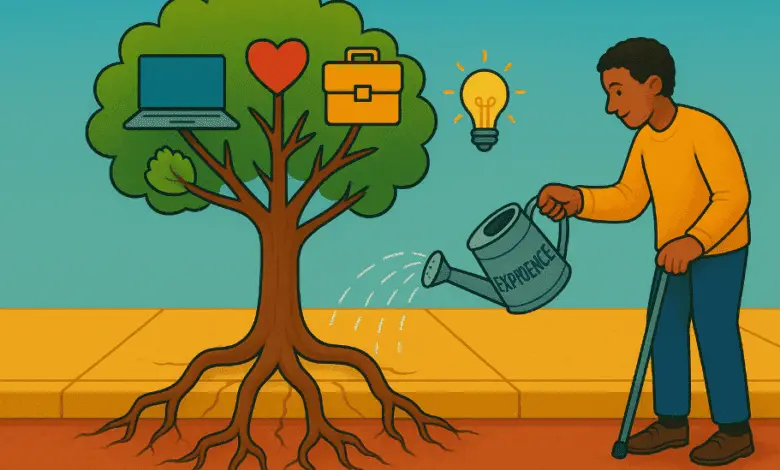
How to Use Your Adaptive Skills in Other Areas of Life
How to Leverage Adaptive Skills in Other Areas of Life
By Cara Siera
Last year, my husband lost his thumb in a work accident. This digit is only about two inches in length and weighs only 20 grams, but its sudden loss brings a jarring realization of just how important it is.
In the months that followed, he adapted his daily routines, finding new ways to do things independently. For example, he learned to grasp a shoelace or a necktie between the pointer and long fingers instead of using the thumb. He also obtained an adaptive tool that allowed him to button clothing with one hand.
These are just a few of the minor challenges we’ve encountered so far, but it quickly became obvious that our change in circumstances would require us to sharpen some skills and learn new ones—skills that would resonate beyond tying a shoe or buttoning a shirt.
If you are a disabled person, you can leverage the skills you’ve learned through facing challenges to benefit you in other areas of life. Below, we’ll consider how you can use your skills at work, in interpersonal relationships, and as a drive and inspiration.
Making the Most of your Adaptive Skills in the Workplace
Life could be described as a series of challenges to overcome, whether or not a person lives with a disability. But a difference or change in ability certainly brings those challenges to the fore. As described at the outset, everyday activities that you gave little thought to before the disability arose become challenging side-quests.
If you need to seek a change of employment, you can include adaptive soft skills like problem-solving in your resume. Last year, Forbes reported that both LinkedIn and McKinsey listed adaptability as one of the most in-demand skills. Related skills of flexibility and resilience are also important. What, exactly, do these terms mean?
- Problem-solving is the ability to identify problems, analyze the situation, and implement effective strategies to overcome them.
- Adaptability is the ability to adjust to changing circumstances.
- Flexibility involves juggling different tasks, adapting to changes, and resolving unexpected problems.
- Resilience is the ability to “bounce back” and thrive despite challenges or changes.
As you read the above, did specific instances in your adaptive journey come to mind?
You may be worried that a career gap due to your injury or illness might work against you in your job search. Instead, treat your journey like a job in itself. Instead of a Work Experience section on your resume, use the heading “Experiences.” Where the job title would be, write “Adaptive Journey.” Then, in the bulleted list, describe how you used the above skills to successfully overcome a specific challenge. This can explain the gap while adding valuable experience.
There are still other soft skills that may help you at work and in your interpersonal relationships—whether with work colleagues, friends, or family. We’ll discuss those next.
Improving Relationships
In the first weeks after the accident, my husband said, “I’m going to have to learn to be more patient.” We all know that we live in a world built for the convenience of non-disabled people. When you are disabled, some things are just going to take longer.
Patience is a valuable quality in the workplace and your human relationships. It involves remaining calm and positive in the face of challenges or delays.
When you are patient, conflicts are less likely, and your overall stress levels will be lower. You may also feel more empathy for others when they struggle or fall short of a goal. You’ll be less likely to express anger, disappointment, or frustration. Your emotional intelligence (EQ) may increase, and your relationships with others will be strengthened.
Allowing Experiences to Drive You Forward
Following his injury, my husband has had more than four months of occupational therapy (OT) so far. We learned that his certified hand therapist (CHT) was inspired to enter the field following his own catastrophic injury. Not only has he helped my husband regain much of the normal use of his hand, but he’s also made a difference in the field by designing innovative equipment.
My husband, too, was inspired by his experiences. During his convalescence, he devoted his time and energy to learning a new field, that of health and life insurance. Having observed the necessity of these first-hand, he desires to help others work through the market and obtain the best coverage for their unique circumstances.
You can use your life experiences to do something good.
For example, you could:
- start a blog and tell your story
- help other people who are facing the same challenges
- speak up for fair rules at work for disabled people
- create a business that makes life easier for everyone
A wise friend counselled, “This injury will not define you.” That is true—you are not defined by your disability or difference. Disability can shape your path—but it doesn’t limit your potential or your direction. But you can use your new found skills like adaptability, resilience, and patience to improve your work chances. You can use it to motivate you and drive you to tackle new challenges and help others.
Additional Resources
NHS Guide to Occupational Therapy
About the Author – Cara Siera

Cara Siera is a prolific business and travel writer with a background in psychology and sociology. She’s been a remote freelance writer since 2016, and her work with ResumeGiants has included a specialisation in these topics. Cara also enjoys poetry, science fiction, British Regency fiction, and the great outdoors.